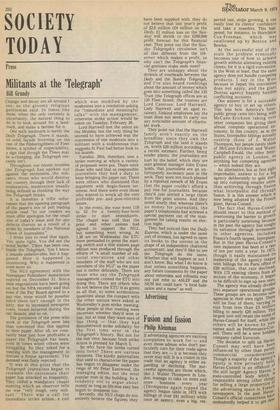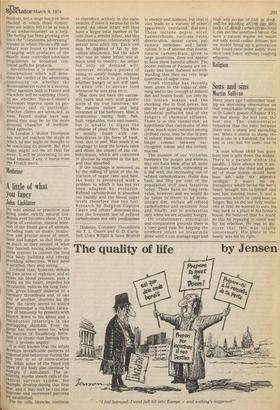Fusion and fission
Philip Kleinman
If advertising agencies are exciting companies to work for — and even those admen who don't particularly care for their trade agree that they are — it is because they never stay still. It is a truism in the trade that an agency is either expanding or declining. The successful agencies are those which, like J. Walter Thompson in London, manage to take on more and more business every year (Thompsons again topped the agency league table in 1973 with billings of over £41 million) while once an agency, even a big, res
Spectator March 9, 1974 pected one, stops growing, it can
easily lose its clients' confidence and take a nosedive. This happened, for instance, to Horniblow , Cox-Freeman, which was I swallowed up by Benton and Bowles.
At the successful end of the scale the problem eventuallY
becomes one of how to achieve growth without alienating existing clients, for it is a rigid convention, in the West at least, that the same agency does not handle competing I products. I say in the West , because in Japan the convention does not apply, and the giant Dentsu agency happily handles conflicting accounts. One answer is for a successful agency to buy or set up others. This was how America's Inter' public group came into being, with McCann-Erickson taking over other companies but giving them almost complete operational autonomy. In this country, as in the States, Interpublic billings actuallY outstrip those of J. Walter Thompson, but people rarely think , of McCann-Erickson and WaseY I Campbell-Ewald, the other Interpublic agency in London, .as anything but competing agencies — which indeed they are.
An alternative, but at first sight improbable, answer is for a big agency deliberately to split itself up into competing smaller units, thus achieving through fission what Interpublic did through fusion. It is this answer which is now being adopted by the French giant, Havas-Conseil.
The fact that Havas-Conseil should resort to this method of overcoming the barrier to growth is particularly surprising because in the past the agency has sought its salvation through investment in other agencies, including France's fourth largest, Interplans,. But in the past Havas-Consell s own expansion has been at a rate of ten per cent a year. In 197.3, though it easily maintained its leadership of the agency league with billings for its Paris office of £50 million, that rate declined; With 173 existing clients from al' sectors of the economy, it began to be difficult to sign up new ones: The agency was already divided into separate operational grouPs• These groups are to become neW agencies in their own right. Ther.e will be four of them, varying. In size from less than £3 millT.n billing to nearly £20 million. Tnisf largest unit will retain the name 0e oHtavearssCwo sl l b eknown e i lfor i t s itself, , while en ti hw names such as Performance-Co, sell. There There will be a new holding company called Eurocom. The decision to split up Hav°5Conseil may well have beein influenced by other than Pure'Y commercial considerationst.: Though a majority of the agencYd' equity is now privately he Havas-Conseil is an offshoot na the still larger Agency Havas• state-controlled body which 's responsible among other thingf for selling a large proportion the advertising space in Frencs“_ newspapers. In the past Hay° c Conseil's official connections ha!„ undoubtedly helped it to get iley'
business, but a stage has now been reached in which these -connections are widely felt to be as much of an embarrassment as a help. The feeling has been growing ever since the "clandestine advertising" scandal in which Havas's PR subsidiary was found to have been arranging with producers of the equally state controlled television Programmes to broadcast concealed puffs for products.
Nevertheless it is commercial considerations which will determine the verdict of the advertising -,community on whether the decentralisation move is a success. Other agencies both in France and elsewhere will be watching closely tO see whether Havas-Conseil's successors improve upon its performance and, in particular, Whether clients are attracted, as some French studies have suggested they may be, by the more Personal character of mediumsized agencies.
In London J. Walter Thompson has not yet reached the stage at Which its size might be thought to be restricting its growth. But that stage might not -be all that far away. It will be interesting to see What lessons, if any, it learns from the French move.
Medicine



































 Previous page
Previous page